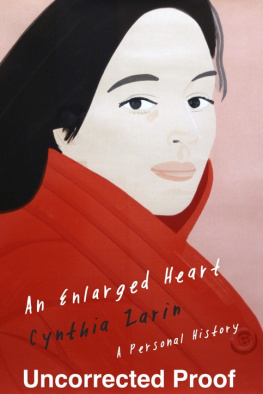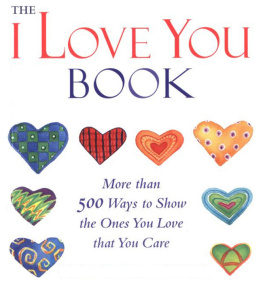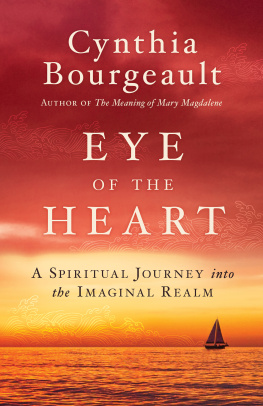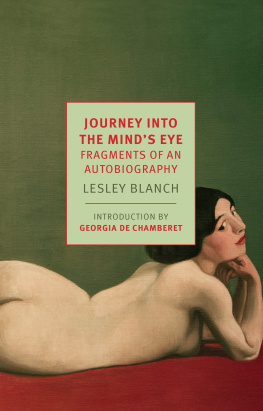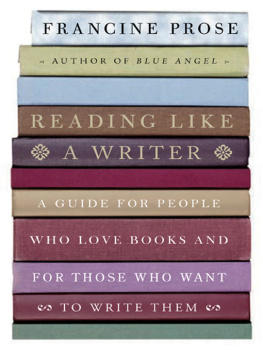
About the Book
An exquisitely written prose debut from the prize-winning poet: the poignantly understated story of a womans life, in all its aspects: love, work, the surprise of times passage, and the ever-widening circles of her lifes recurrent themes.
An intertwining round of episodes in the life of New York writer Cynthia Zarin charts the shifting parameters of love, life, and family in writing that feels nearly fictional in its richness of scene, dialogue, and mood. Cynthia herselfnow in her fiftiesis the marvelous and rueful character at the center of these tales, who yearns to live in the rapidly fading New York of people like Mr. Ferri, the tailor (a wren of a man with pins flashing in his teeth). By the end of the book, the bewildered young woman has come to own Mary McCarthys file cabinet, has married twice and raised two batches of children, and learned that there are some truths which no tailor can alter. Whether writing about coats she owned, vanished restaurants, a newlywed journey to Italy, or the inner life of the New Yorker staff she knew as a young woman, Cynthia shows us how persistent the past is in returning to us with entirely new lessons.
Published by Knopf, February 2013.
About the Author
CYNTHIA ZARIN was born in New York City and educated at Harvard and Columbia. She is the author of four collections of poetry and several books for children. She writes for a wide range of magazines and journals, including The New Yorker and The New York Times. The recipient of fellowships from the National Endowment of the Arts and the Ingram Merrill Foundation, she teaches at Yale University and lives in New York City.
ALSO BY CYNTHIA ZARIN
The Ada Poems
The Watercourse
The Swordfish Tooth
Fire Lyric
FOR CHILDREN
Albert, The Dog Who Liked to Ride in Taxis
Saints Among the Animals
Wallace Hoskins, The Boy Who Grew Down
What Doo You See When You Shut Your Eyes
Rose and Sebastian

This is an uncorrected eBook file. Please do not quote for publication until you check your copy against the finished book.
This Is a Borzoi Book
Published by Alfred A. Knopf
Copyright 2013 Cynthia Zarin
All rights reserved. Published in the United States by Alfred A. Knopf, a division of Random House, Inc., New York, and in Canada by Random House of Canada, Limited, Toronto.
www.aaknopf.com
Knopf, Borzoi Books, and the colophon are registered trademarks of Random House, Inc.
A number of the chapters in this book first appeared, in somewhat different form, in the following publications, Curious Yellow, Curtains, and Sperlonga (as Earrings) in The New York Times Magazine; September (as Evensong) in The New York Times; An Enlarged Heart, in The New Yorker and in The Best American Essays, 2004, edited by Louis Menand; Real Estate in Subtropics; Two Pictures in Document; Restaurants in Granta, and Going In in Little Star. A section of Sperlonga also appeared in The New Yorker.
Library of Congress Cataloguing-in-Publication Data
[Tk]
Manufactured in the United States of America
First Edition
For Eve
and
for Bill
Continent, city, country, society:
the choice is never wide and never free.
And here, or there No. Should we have stayed at home,
wherever that may be?
ELIZABETH BISHOP
Questions of Travel
Contents
Real Estate
I n the apartment where we used to live, the front door opened to a long hall. At the end of that hall was a window, a fire escape, and beyond that the view opened up like a painted fan. In the middle distance was the green copper roof and steeple of a huge church. Beyond it lay the low flat rooftops of Harlem, the elevated train, and a narrow bright wire of river. I never learned the name of that church, although every day I admired it. I thought it looked like a church in Prague. When once I said that to my old friend, who has been to Pragueshe, unlike me, has been everywhere, while I, who live three blocks from where I was born, am the most provincial person in the worldshe told me I was ridiculous, it looked nothing like churches in Prague, it looked as little like a church in Prague as it was possible to look. Nevertheless I continued to think that in my mind, like a child who has been told that the words she is singing to a song are wrong, but continues to sing them.
Not everyone had kind words for this view. After we moved out, the woman who bought that apartment came to see me. It was a winter evening, and she had on a violet wool coat that I immediately coveted. At that time the cost of heating was astronomical, and we kept the house to which we had moved so cold that the tiny stars of snowflakes on her coat stayed frozen. She told me that a month after moving into the apartment she had discovered that her husband was having an affair with a younger woman. Now less than a year later, they were divorced. When I first met this woman, whom I will call Joan, I felt I already knew her, because she so reminded me of the mother of a boy I had once loved. She had her long, wide, flat bones and straight brown hair that fell in a comma over her forehead. Both of them were from the South, and decisive. After I had left school, and my friend and I had parted, his mother came once to visit me in the small grimy city where I was bored and unhappy. She was on her way back to India, where for half the year she sat at low wooden tables in houses that flooded during the rainy season and taught women to read. The other half of the year she lived in an apartment in New York near Carl Schurz Park. At that time her life greatly appealed to me, and I imagined that someday I too would do good work, crouching in mud, and bestowing beneficence. I had no idea that I was entirely unsuited to selflessness. As a way out of my boredom and unhappiness and the slight fear I felt every time I walked out the door in this city (once on the way home from a store a car had followed me), I was learning to cook. I had picked up a paperback in a used book store. It was Elizabeth Davids French Provincial Cooking. Standing in the bookstore, Id read, in the section on sweets, the words, Everyone knows the recipe for chocolate mousse. I did not, but I wanted to. I wanted to be a person who knew things, and I believed then that there was a programmatic way to learn this. I was in this city, accompanied by a boyfriend with whom my exchanges had become increasingly rancorous, because I had been given a fellowship to spend a year writing poems, but month after month, I couldnt think of a single poem. Out the back windows of the apartment I could see the blank windows of closed-down redbrick factories, and the huge hands of the electric company clock. The hands of the clock were lit day and night, and folded and unfolded like a giants pocket knife. I had counted the recipes in the book; if I made one recipe a day, the year would be over. By then, I was sure, I would know what to do next.
The day my friends mother arrived, I was making onion soup. It was the kind of recipe I liked then, because it took hours. She took the onion out of my hand. I was cutting it the wrong way. She put a second onion on the chopping board and showed me how to make tiny crosshatched squares without splitting the root. See, she said, now you know how to cut an onion. The gray sky of the city out the back window of the kitchen was punctuated with white church steeples. Each set of bells was timed differently, so that the five minutes before and after each hour were cacophony. My friends mother was upset by this. She was drinking whiskey and she put down her glass. The disorganization struck her as unconscionable. Years later I had a friend whose mother threatened to blow up her house if she didnt get a clock that worked, and I thought of those bells.
Next page
